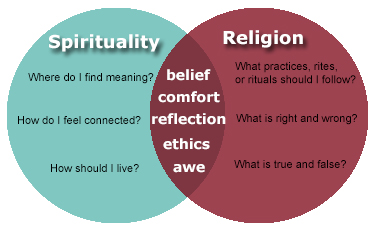

Spirituality is a broad concept with room for many perspectives. In general, it includes a sense of connection to something bigger than ourselves, and it typically involves a search for meaning in life. As such, it is a universal human experience—something that touches us all. People may describe a spiritual experience as sacred or transcendent or simply a deep sense of aliveness and interconnectedness.
Some may find that their spiritual life is intricately linked to their association with a church, temple, mosque, or synagogue. Others may pray or find comfort in a personal relationship with God or a higher power. Still others seek meaning through their connections to nature or art. Like your sense of purpose, your personal definition of spirituality may change throughout your life, adapting to your own experiences and relationships.

While spirituality may incorporate elements of religion, it is generally a broader concept. Religion and spirituality are not the same thing, nor are they entirely distinct from one another. The best way to understand this is to think of two overlapping circles like this:
In spirituality, the questions are: where do I personally find meaning, connection, and value?
In religion, the questions are: what is true and right?
Where the circles overlap is the individual experience, which affects the way you think, feel, and behave.
We recognize that healthcare involves treating the whole person and that spiritual wellbeing can help improve health and quality of life. Spiritual care attends to a person’s spiritual or religious needs as he or she copes with illness, loss, grief or pain and can help him or her heal emotionally as well as physically, rebuild relationships and regain a sense of spiritual wellbeing.
There is no one definition of spirituality, but in general, spirituality:
These experiences are part of being human; they are as present in people with a learning disability and other conditions, such as dementia or head injury, as they are in anybody else. Furthermore, spirituality often becomes more important in times of distress, emotional stress, physical and mental illness, loss, bereavement and the approach of death. All healthcare tries to relieve pain and to cure, but good health care tries to do more. Spirituality emphasizes the healing of the person, not just the disease. It views life as a journey, where good and bad experiences can help you to learn, develop and mature.
As part of an interdisciplinary healthcare team, Spiritual Health professionals:
A dynamic and intrinsic aspect of humanity through which persons seek ultimate meaning, purpose, and transcendence, and experience relationship to self, family, others, community, society, nature, and the significant or sacred. Spirituality is expressed through beliefs, values, traditions, and practices, including religious beliefs and practices.
Members of the Interfaith Healthcare Association of Manitoba draw inspiration from the beliefs and values of each of their judeo-christian heritage and seeks to provide an open, caring and compassionate environment that empowers individuals to draw on their own beliefs and practices for comfort, courage and strength, recognizing the invaluable healing powers of the human spirit.
Service users who engage in spiritual care and practices report better self-control, self-esteem and confidence, faster and easier recovery (often through healthy grieving of losses and through recognising their strengths), better relationships – with self, others and with God/creation/nature and a new sense of meaning, hope and peace of mind, which allows them to find healing (in distinction to cure) and to accept and live with continuing problems.